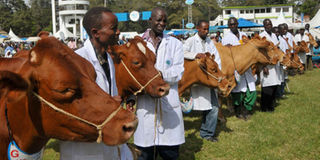State to vaccinate 61 million livestock to boost production

PHOTO | FILE Cattle on display at a livestock breeders show in Nairobi.
What you need to know:
- Measures will also be put in place to strengthen surveillance and introduce an advanced reporting system utilising new technology
The government has unveiled a plan to improve trade in livestock by vaccinating 61 million livestock in the next financial year.
According to budget estimates released on Thursday, the animals will be vaccinated against foot and mouth disease and other trade-sensitive diseases.
Measures will also be put in place to strengthen disease surveillance and introduce an advanced reporting system using Digital Pen Technology.
Disease-free zones
Kenya has in recent years been trading in live animals, which are exported mostly to the Middle-East.
It has also been striving to create disease-free zones to improve on the marketability of its meat and meat products in Europe which has a stringent regime for products that are allowed into that market.
So far, parts of Coast region have been classified as disease-free zones and are used as holding grounds for cattle.
The government intends to improve on control of deadly animal diseases like trypanosomiasis by reducing the density of tsetse fly by 4 per cent in the next financial year.
The government has planned to reach 5.1 million pastoralists through field days, shows, farm visits and exhibitions, and rehabilitate 7,500 denuded rangelands.
In the year, 21 abattoirs will be constructed and commissioned and 260 farmers’ groups supported with value addition facilities in centres along the milk corridors. Stakeholders in leather industry totalling 440 will be trained on value addition.
Meanwhile, agriculture officials say Kenya could make as much as Sh1.6 billion annually if trypanosomiasis was eradicated in the country.
Dr Steve Kemp, the programme leader animal Biosciences, observed that in tsetse infested areas, trypanosomiasis reduces the output of meat and milk by a half and was a threat to livestock production.
“Use of the right dosage is crucial in treating the disease. Unscrupulous traders who interfere with the drugs to sale more and earn more are not helping to contain the disease but are contributing to resistance to drugs,” Dr Kemp said.
The scientists spoke during a meeting with journalists at the Institute’s headquarters during a briefing on breakthroughs in research on diseases of livestock and people in developing countries.
They cited shortage of enough data to inform policy on best ways to control and treat diseases has the main challenge facing efforts to reduce human and animal infection rates.
Agriculture Permanent Secretary, Dr Romano Kiome admitted that trypanosomiasis still posed serious challenges to livestock production hence the need to build local capacity of Kenyan scientists to update relevant data that can help fight off the disease.
The PS who is also ILRI’s board member said the country cannot accumulate data without scientists coming to carry out research aimed at addressing challenges bedevilling this country.
“It is absolutely necessary we build data. Let’s support our scientists. The government has extended retirement age for scientists to 65 years besides other benefits as part of a deliberate strategy to give them ample time to do research,” said Dr Kiome.
He said Kenya was among the few countries with a fully-fledged trypanosomiasis research institute. “We welcome research as we make great strides to combat this disease and improve livestock production. The global partners are important in helping Kenya achieve its development goals,” said the PS.




